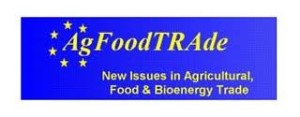The global agricultural market is driven by a complex combination of demographic, socioeconomic, technological, and political developments. To address uncertainties stemming from these dynamic factors, IFPRI joined 15 institutions from 2008 to 2011 to form a consortium to implement the New Issues in Agricultural, Food and Bioenergy Trade (AgFoodTrade) program. This program launched a series of research projects related to international trade and trade negotiations. AgFoodTrade focused on methodological development in areas that commonly raise problems for modelers and analysts, such as the linkage between EU agricultural policy and world markets; the impact of new demand for food, feed, and fuel on the agricultural sector; the impact of demographic changes on demand for food; and the role of different tariff and non-tariff measures affecting trade.
Results
AgFoodTrade developed innovative tools, models, and databases that are helpful to decision makers and trade negotiators in analyzing current and planned trade negotiations and agreements, including their effects on global welfare. IFPRI specifically contributed methods of measuring and tracking price volatility and price stabilization policies for developing countries. By the end of the project, 64 publications and 75 working papers were produced.
Outcomes
- The consortium oversaw the development and documentation of the MAcMapHS6-v2 database on bilateral applied tariffs. This database is widely used by academics and researchers and is the source of trade policy data for the Global Trade Analysis Project, or GTAP 7 (www.gtap.org); IFPRI researchers played a leading role in the development of this database. The database also acts as the main source of information for many studies done for the EC’s Directorate General for Trade and for large-scale assessments such as Unfinished Business? The WTO’s Doha Agenda.
- IFPRI’s research in the field of global trade negotiations has been particularly widely cited. “The Potential Cost of a Failed Doha Round” concluded that a Doha agreement would provide an “insurance policy against future protectionism” and support the World Trade Organization (WTO) system. This article has been discussed in a variety of journals and books and was quoted in The Economist. National and international entities, including the United States Congress, the UN Economic and Social Commission for Asia and the Pacific, and the United Kingdom’s Prime Minister David Cameron, have used this article to inform trade policy discussions. The findings were also used by the director-general of the WTO, Pascal Lamy, in his opening speech to the ministerial meeting of the WTO in December 2011.



